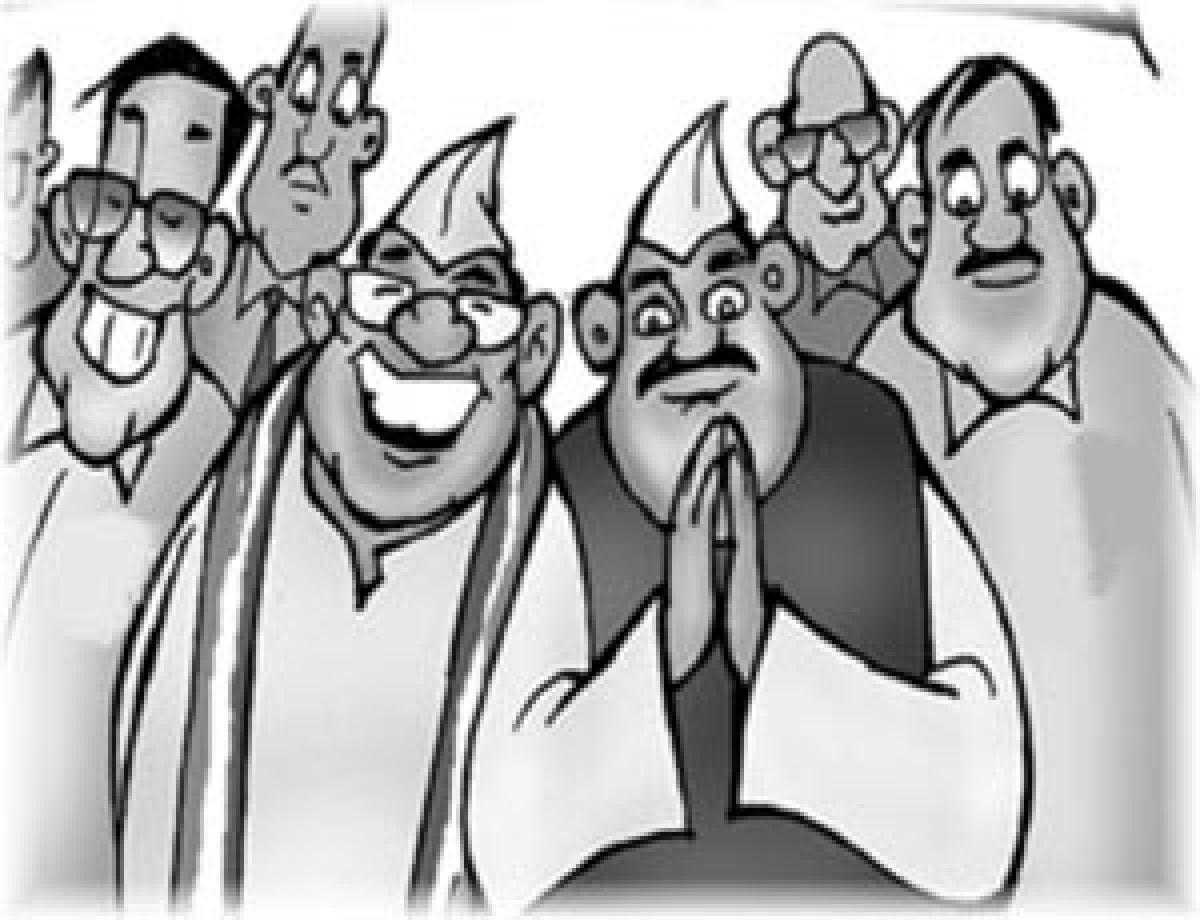Live
- Dark-Humor Thriller 'Snakes & Ladders' Set for Global Premiere on October 18
- IAF set to celebrate its 92nd Raising Day
- Children should taught about importance of wildlife: MP Governor
- ‘Rising Rajasthan’ pre-summit of Mines Department to be theme-based
- CBI files interim report before Delhi High Court in coaching centre deaths
- Kingfisher Takes Over Oktoberfest in India with 'Mug It Up!' Campaign – A Celebration of Beer, Music, and Connections
- LEAD Group Recognises Schools and Their Leaders as Pillars of India’s Education at the 2023 Shiksha Awards Conducts Masterclass on School Leadership
- Usha hosts Karra Samu Championship in Andhra Pradesh
- Kadapa Municipal Corporation Commissioner Inspects Sanitation and Vehicle Depot Operations
- Piaggio Vehicles commissions its first Motoplex dealership in Visakhapatnam
Just In

Of late, persons in politics are worried about being called politicians and they want people to recognise them as ‘statesmen.’ Thus, an increasing interest is generated in drawing a distinction between the two. To go into the meaning of the term ‘politician,’ the ‘Longman Dictionary of Contemporary English’ describes one as ‘some who works in politics,’ especially an elected member of the governme
Of late, persons in politics are worried about being called politicians and they want people to recognise them as ‘statesmen.’ Thus, an increasing interest is generated in drawing a distinction between the two. To go into the meaning of the term ‘politician,’ the ‘Longman Dictionary of Contemporary English’ describes one as ‘some who works in politics,’ especially an elected member of the government. It also describes him or her as someone who is skilled at dealing with the people or using the situation within an organisation to gain an advantage. It is in fact, the latter expression that appears to have been accepted by the people widely.
Though there is a scathing attack by George Bernard Shaw remarking that politic is the last resort of a scoundrel, there is an increasing passion among the wealthy to become politicians. The Alternative Democratic Reforms (ADR), an NGO fighting for the cause of purity in politics, made out a report on the ‘Indian Political System becoming Costly and Wealthy.’ The amounts spent in General Elections are growing year after year.
The Election Commission (EC) is also forced to raise the bar from time to time in permitting the candidates to incur expenditure. It is anybody’s guess that the thresholds are never followed and litigation in this respect is deepening over time. There is no mechanism created to assess the actual expenditure incurred by the candidates contesting the elections, excepting the fixation of limits on expenditure permitted to be incurred and the ‘appointment of observers’ to oversee the process.
As of now, the EC mandates a maximum expenditure of Rs 28 lakh per candidate for campaigning in case of Assembly Elections and Rs 70 lakh in case of Lok Sabha. As per the newspaper reports, in the recently held Assembly Elections in Kerala, the total expenditure incurred was put at Rs 500 crore.
It is also increasingly becoming evident that politics is reducing to be the professional choice of only wealthy. As per the survey reports of ADR, 443 of the 542 members of the Lok Sabha have assets more than Rs 1 crore. Further, the average asset holding of the winners to the 2009 Lok Sabha was pegged at Rs 3.65 crore. The same has grown 4.65 fold by 2014 elections to remain at Rs 14.29 crore.
That politics is revolving around money is also evident from the large amounts of donations raised by the political parties for participating in the elections. As per the available information, between 2004 and 2015, various political parties raised an amount of Rs 5,683.44 crore from various individuals, corporates and other NGOs as donations for being in the fray.
When such is the reality, persons in politics are feeling uncomfortable to be treated as simple ‘politicians,’ but want people to recognise them as ‘statesmen.’ Regarding the meaning of the term ‘statesman,’ the Longman Dictionary describes him/her as a “political or government leader; especially one who is respected as being wise and fair.” Thus persons in politics are now craving for such respect and want people to recognise them as wise and fair.
In philosophy, it is said that there are three kinds of people: some are born great; greatnesses is thrust on some; and some acquire greatness. In these three categories, politicians stake claim to the first two. They feel that they are born great or they want the electorate to thrust greatness on them. Even if none happens, they publicise greatness on their own. The last appears to be the ‘general psyche’ of the present ‘breed of political leaders.’
Statesmanship is a recognition to be acquired by the persons in politics through their fair, just and equitable conduct. Henry Kissanger, the former Secretary of State of United States, a political scientist-turned-diplomat who also received the Nobel Prize in 1973, is regarded by one and all as a great statesman. The profile and stature of such persons suggest that a statesman is one who is an embodiment of intellectual prowess, tough and skillful negotiating style, and ruthless pragmatism.
Above all, he or she is the one who imprints the interests of the State on his mind and does not budge from the same under any critical situation. It is thus anybody’s analogy as to how the political system is functioning now. Based on this, is there a scope to dare to say that we have ‘statesmen’ in politics of the present times? (Writer is former Vice-Chancellor, Acharya Nagarjuna University)
By Prof K Viyyanna Rao

© 2024 Hyderabad Media House Limited/The Hans India. All rights reserved. Powered by hocalwire.com







